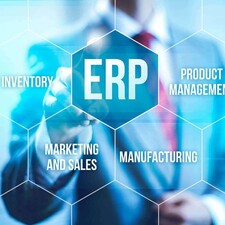Blog
To Make the Right ERP System Investment, Focus on Value Creation, Not Cost - Part 2

Summary
When discussing the implementation or upgrade of an ERP solution, cost tends to dominate the conversation. This is misguided and can be limiting for a business. Smart businesses instead focus their ERP selection process on the value opportunities that various ERP systems can bring – how the right ERP system can help them grow, become more efficient, adapt to new markets, increase profitability and more.
In the first part of our two-part series on creating value through ERP, Alan Salton, President of abas USA, discussed how ERP provides informational value, transformational value and organizational value. Here are three more value-add opportunities worth including in your discussions around ERP investment.

4. Human capital value
How a business hires, trains, utilizes and retains talent directly impacts its bottom line, its productivity, and its ability to reach its goals. In short, people matter.
“Workers see things - waste, opportunities, trouble brewing - that their managers or supervisors may only hear about at occasional team meetings,” said Salton. “They see things first-hand that senior leaders experience only through unbalanced spreadsheets, negative reports and targets missed. Smart management finds ways to capture and act on that knowledge.”
Top-to-bottom collaboration and continuous improvement has never been so second-nature as it is using ERP-powered human capital management.
Business Process Management is an important component of advanced ERP solutions. BPM allows companies to design and visualize any process workflow, assign stakeholders, track the status of in-progress work with clarity in real time and record every step along the way for future use. In this way, employees contribute to the structuring and restructuring of workflows based on data they help their employers discover. Additionally, as new business models require new skills, employers can train workers according to processes optimized through BPM, saving time and resources.
Top-to-bottom collaboration and continuous improvement has never been so second-nature as it is using ERP-powered human capital management.

5. Value through IoT and automation
With help from ERP, the Internet of Things – a distributed network of advanced interconnected devices and sensors – has already reshaped the industrial sector in its image.
Once businesses have the power to automatically draw out critical data and place it into ERP systems that can convert it into actionable business intelligence, what are they capable of?
- Real-time operational performance assessments from the shop floor.
- Thermographic, vibrational and tribological analysis for predictive, condition-based asset maintenance.
- Next-level energy management.
- Immediate noncompliance reporting.
- Greater supply chain and material flow transparency.
- Advanced monitoring capabilities for remote assets.
This is hardly where the list ends. In fact, what the IoT can't do is limited only by the speed of innovation. ERP systems are what give this incredible influx of data a purpose, whether it be to improve safety, curb reactive repair costs, develop strategic supply transactions or chart change as our businesses evolve with the times.

6. Technological value
As transformative as IoT technology has been for industrial businesses, it will not be the last great transformation the sector undergoes.
“We live in an era where the next great disruption is just around the corner,” said Salton. “Businesses can’t afford to be caught flat footed.”
We live in an era where the next great disruption is just around the corner, businesses can’t afford to be caught flat footed.
When the next big change comes along, will the leaders at your company possess the foresight and ability to capitalize on these innovations? Or will inflexibility and caution get the better of them?
Regardless of what the next generation of industry brings, modern ERP software will be your future-proof platform for integration. Whether the next industrial disruption alters your supply chain, your audience, your product or your process, ERP offers businesses the freedom to reinvent themselves while still retaining their identities as brands and difference-makers.
Visit the abas blog for more tips on ERP selection and implementation. Or email us to schedule a demo.

Alan Salton is the President and Founder of abas USA, Inc. and serves on the abas global Board of Directors as the Chief Innovation Officer. He holds a Masters in Technology Management and a Certificante in Business Process Management. With nearly three decades of experience helping businesses of all types and sizes successfully select and implement ERP systems, Salton is an established leader in the ERP industry.
Read the first part of our two-part series on creating value through ERP.


